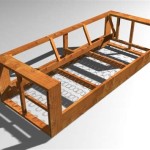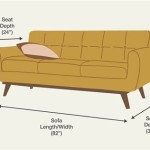Sleeping On A Sofa Bed Long Term: Considerations and Potential Impacts
Sofa beds, also known as sleeper sofas or pull-out couches, offer a versatile furniture solution, functioning as both seating and temporary sleeping arrangements. They are particularly useful in smaller living spaces, guest rooms, or home offices where a dedicated bedroom is not available. However, relying on a sofa bed for long-term sleep presents a range of considerations, impacting comfort, health, and overall well-being.
The primary concern when using a sofa bed long term centers around the mattress. Unlike traditional mattresses designed for consistent nightly use, sofa bed mattresses are often thinner, constructed from less durable materials, and segmented due to the folding mechanism. This design prioritizes space-saving functionality over optimal sleep support. Consequently, individuals may experience discomfort, disturbed sleep patterns, and potential long-term health implications.
Another significant factor is the frame and mechanism of the sofa bed itself. Repeated unfolding and folding can wear down the hinges, springs, and supporting structures. This wear and tear can lead to instability, uneven weight distribution, and squeaking noises, further detracting from sleep quality. Furthermore, the frame may lack adequate ventilation, potentially trapping moisture and leading to the growth of mold or mildew, affecting both the sofa bed's integrity and the user's respiratory health.
Mattress Quality and Support
The most immediate and noticeable difference between a dedicated mattress and a sofa bed mattress is the level of support provided. Standard coil mattresses, memory foam mattresses, or hybrid mattresses are engineered to conform to the body's contours, distributing weight evenly and minimizing pressure points. This ensures proper spinal alignment and reduces the likelihood of developing aches and pains. Sofa bed mattresses, on the other hand, are often significantly thinner, typically ranging from 4 to 6 inches in thickness. This limited thickness provides minimal cushioning and support, particularly for heavier individuals or those with pre-existing back problems.
The materials used in sofa bed mattresses also contribute to the lack of support. Inexpensive models often utilize low-density foam that compresses easily and loses its shape over time. This compression can lead to sagging in the middle of the mattress, creating an uneven sleeping surface that forces the body into unnatural positions. In contrast, higher-quality sofa beds may feature memory foam or innerspring coils, offering a more supportive and comfortable sleeping experience. However, even these upgraded options typically fall short of the performance of a dedicated mattress.
The segmented design of a sofa bed mattress is another critical factor impacting support. To facilitate folding and unfolding, the mattress is usually divided into sections, creating seams and gaps that can be felt during sleep. These seams can dig into the body, causing discomfort and potentially disrupting sleep. Over time, the seams may also weaken and tear, further compromising the mattress's integrity and supportiveness. Even placing a mattress topper on a sofa bed to mitigate these issues may not provide adequate correction for the underlying inadequate support structure and design.
Impact on Physical Health
Prolonged use of a subpar sleeping surface, such as a poorly designed sofa bed, can have a variety of negative consequences for physical health. One of the most common complaints is back pain. The lack of proper spinal alignment and support can strain the muscles and ligaments in the back, leading to stiffness, soreness, and even chronic pain. Individuals with pre-existing back conditions are particularly vulnerable to experiencing exacerbated symptoms when sleeping on a sofa bed long term.
Neck pain is another frequent issue associated with inadequate sleep support. A thin or uneven mattress can force the neck into an awkward position, leading to muscle strain and stiffness. The lack of proper neck support can also contribute to headaches and migraines. Furthermore, individuals who sleep on their stomach may experience increased neck pain due to the unnatural angle required to breathe comfortably.
In addition to back and neck pain, sleeping on a sofa bed long term can contribute to joint pain. The lack of cushioning and support can place excessive pressure on the joints, particularly the hips, knees, and shoulders. This pressure can exacerbate existing joint conditions, such as arthritis, and may even lead to the development of new joint problems. Individuals who are overweight or obese are at a higher risk of experiencing joint pain related to sleeping on a sofa bed due to the increased weight placed on their joints.
Furthermore, poor sleep quality associated with an uncomfortable sleeping surface can weaken the immune system. During sleep, the body produces cytokines, proteins that help fight inflammation and infection. When sleep is disrupted, the production of cytokines is reduced, making the body more susceptible to illness. Chronic sleep deprivation can also increase the risk of developing conditions such as heart disease, diabetes, and obesity.
Alternatives and Mitigation Strategies
While using a sofa bed for long-term sleep is not ideal, there are strategies that can help mitigate some of the potential drawbacks. Investing in a high-quality mattress topper is one of the most effective ways to improve comfort and support. A memory foam or latex topper can provide additional cushioning and contouring, helping to alleviate pressure points and improve spinal alignment. The thickness of the topper should be carefully considered, as a thicker topper will offer more support but may also make it more difficult to fold the sofa bed.
Choosing a sofa bed with a higher-quality mattress is another important consideration. Look for models that feature innerspring coils or memory foam, as these options typically provide better support than traditional foam mattresses. It is also important to consider the thickness of the mattress, opting for the thickest and most supportive option that the sofa bed can accommodate.
Proper maintenance and care of the sofa bed can also help to prolong its lifespan and improve comfort. Regularly cleaning the mattress and frame can prevent the buildup of dust, allergens, and mold. Rotating and flipping the mattress can help to distribute wear evenly and prevent sagging. Additionally, ensuring that the frame and mechanism are properly lubricated can prevent squeaking and instability.
Consideration should also be given to the sleeping environment. Ensuring the room is dark, quiet, and cool can promote better sleep quality. Using blackout curtains, earplugs, or a white noise machine can help to minimize distractions. Maintaining a consistent sleep schedule can also help to regulate the body's natural sleep-wake cycle.
If long-term sofa bed sleeping is unavoidable, exploring alternative sleeping solutions should be considered. Options such as a folding bed frame with a separate mattress, or a futon with a supportive mattress pad may be more comfortable and supportive than a traditional sofa bed. These alternatives often offer a more stable and supportive sleeping surface, reducing the risk of back pain and other health problems.
Ultimately, the decision of whether to sleep on a sofa bed long term depends on individual circumstances and priorities. While it may be a necessary solution in some situations, it is important to be aware of the potential drawbacks and to take steps to mitigate them. By investing in a high-quality mattress topper, choosing a sofa bed with a supportive mattress, and maintaining proper care, it is possible to improve comfort and reduce the risk of negative health consequences. However, whenever possible, prioritizing a dedicated mattress designed for long-term sleep is recommended for optimal health and well-being.
.jpg?strip=all)
Is It Okay To Sleep On A Sofa Bed Every Night Pros And Cons
.jpg?strip=all)
Is It Okay To Sleep On A Sofa Bed Every Night Pros And Cons
.jpg?strip=all)
Is It Okay To Sleep On A Sofa Bed Every Night Pros And Cons

Is It Okay To Sleep On A Sofa Bed Every Night Pros And Cons

Does Sleeping On The Couch Have Any Health Benefits Or Side Effects

5 Reasons Why It S A Bad Idea To Fall Asleep On The Sofa Sleep Advisor

Is It Okay To Sleep On A Sofa Bed Every Night Pros And Cons
Can You Sleep On A Sofa Bed Every Night

Is Sleeping On The Couch A Good Idea

Is It Bad To Sleep On The Couch Living Spaces








